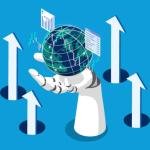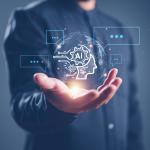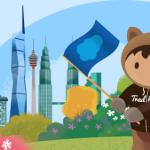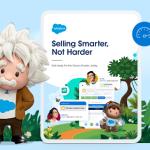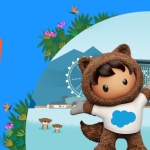If you’re like most people, you probably think there’s a good chance that AI or robots will have a significant impact on the global job market. Yet surveys also show that most of us think that these disruptive technologies are primarily going to affect someone elseーsomeone with a skill set or an educational background that lends itself to repeatable work. This is a risky assumption on everyone’s part, including mine.
AI and robotics aren’t just for everyone else to think about. The robots are not only coming — they’re already here. But that doesn’t mean we’re all out of a job. It means that we need to explore opportunities for ourselves and our teams to humanise the future of work to complement and even enhance AI, automation, and productivity.
At Salesforce, we recently invited award-winning New York Times technology columnist Kevin Roose to discuss the impact automation is likely to have on our lives and jobs. Roose shared that AI and automation are already changing the way we work — particularly for highly-educated, white-collar workers, whose everyday jobs are already evolving thanks to AI.
Predicting the impact of automation technology on the future of jobs
In the course of research for his book “Futureproof: 9 Rules for Humans in the Age of Automation,” Roose found that for hundreds of years, we’ve been predicting what machines can and can’t do — and that usually, we’re wrong.
Here are a few examples to his point:
- “I can state flatly that heavier-than-air flying machines are impossible.” —Lord Kelvin, 1895
- “There is no prospect whatsoever that the employment of electronic digital computers in the field of translation will lead to any revolutionary changes.” —Yehoshua Bar-Hillel, 1962
- “You won’t get the best seating or the best fares … what happens if you just press the wrong button?” —travel agency owner quoted in a 1984 New York Times article on the first automated ticket machines at airports
The disruptive technologies that would prove each of those predictions wrong went on to reshape economies and workforces forever. Yet at the time, each statement reflected widely-held beliefs. In the early 1980s, for instance, people were very skeptical that computers would ever meaningfully replace human travel agents. That changed quickly with the advent of travel-booking websites, which gave consumers direct access to making arrangements without a travel agency rep or the associated fees. Today, it’s a lot more likely that you use online sites to book everyday travel, except when using a travel agent is mandated as a workplace policy.
Where AI is changing the job landscape
Although many of us still think of robots on the assembly line as the typical agent of job displacement, AI has made advances in fields that many people never imagined were vulnerable to automation:
- Healthcare: Machine-learning algorithms can diagnose some types of cancer or perform common X-rays with better accuracy than human radiologists. Other AI applications are in the works that can detect illnesses that range from cancers to Parkinson’s disease from smelling human breath.
- Creative work: AI can compose music, write prose, build video-game levels, and write newspaper articles indistinguishable from human output.
- Coding: Low-code or no-code development platforms take the complexity out of coding.
- Analysis/pattern recognition: AI and machine learning are analysing data sets to identify patterns and trends. They are reporting real-time insights and can even predict, in some cases, what’s likely to happen next.
- Influencers: Some of the biggest social-media influencers aren’t human — they are AI-designed models.
- Lip-reading: While the average human accurately lip-reads 54% of the time, a deep network created by Oxford and Google DeepMind scientists, LipNet, reached a 93%success score in reading people’s lips.
- Creating AIs: Given the ability AI has to quickly process large data sets, it’s able to create child AI applications that outperform human-created AIs.
- Listening: Whether it’s adding items to your shopping list, or producing meeting minutes from our Zoom calls, AI applications can more accurately capture and process what they hear than many humans.
When you hear stories like this, it’s easy to feel uneasy. Like many of us, as Roose was writing about the inroads AI was making, he got worried about his own replaceability as a journalist. He embarked upon a path to research how we can avoid being replaced by robots, which is the premise of the book and the bulk of his presentation.
How to future-proof your career
Now an important question: What can we do as individuals to protect ourselves from being replaced by AI and robots? First, the bad news: Pretty much every job as it exists today can, in some way, be automated. In all honesty, there isn’t any technology-proof job or career path for the long-term.
Now, the good news: Human creativity and resolve is at an all-time premium. And it’s not limited to big “C” creatives like (insert your favourite artist, composer, scientist, or performer).
This is not a time to panic — it’s a time to build on the roles and capabilities that can be automated to deliver new value at every level. Upskilling is now for everyone. We are all students again. Creativity, empathy, critical thinking, collaboration, data science, resilience, adaptability, and other “not-so-soft” skills are ranked as critical for everyone in a pandemic world and beyond.
As AI drives down the price of goods and automated services, it also increases the value of human goods and human experiences. It rewards those that are good at creating these new things in collaboration with machines.
With this in mind, there is one primary thing you can do to make your job a little more future-proof, regardless of what it is: not so ironically, be human.
The best way to differentiate yourself is through your humanity and creativity, not your productivity. Accentuate the human labor involved in what you do or what you make — whether it’s making a ceramic bowl, providing customer service, selling a technology product, or how you show up in any given moment to be present, aware, and ready to participate.
Think beyond using AI and automation to work as fast, at scale, and cheaply as possible. That’s what everyone else will do. Make that human touch more visible and more value-added. This is what the human economy is about: experiences and feelings that machines cannot replicate. Experiences are personal on every side. That’s what makes them special. They involve human beings and in reality, it’s that humanity combined with meaningful experiences, that we’re going to seek out and pay a lot for.
Skill up for the future. Visit Trailhead to learn Salesforce, digital, and soft skills you need to succeed.



This post was originally published on the U.S.-version of the Salesforce blog.













